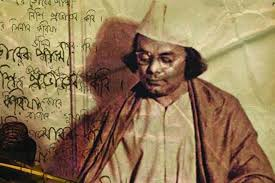Featured
- Get link
- X
- Other Apps
Kazi Nazrul Islam...
Kazi Nazrul Islam....
Nazrul's early life was marked by poverty and hardship. Despite these challenges, he had an insatiable thirst for knowledge and a deep love for literature. He taught himself to read and write, and by the age of ten, he was composing poetry in Bengali.
Nazrul's literary career began in earnest in the 1920s when he moved to Kolkata, the cultural capital of India. He soon became a prolific writer, publishing over three dozen volumes of poetry, essays, and novels during his lifetime. His works were marked by their intense emotional depth, their themes of social justice, and their revolutionary spirit.
Nazrul's poetry was deeply influenced by his experiences of poverty, discrimination, and political oppression. He wrote about the struggles of the working class, the oppression of women, and the need for social and political change. He was also a powerful voice for religious unity, arguing that all religions shared a common goal of social justice.
In addition to his literary work, Nazrul was also a gifted musician. He composed over 4,000 songs in Bengali, many of which have become classics of Bengali music. His songs were often political in nature, and they became anthems for the Indian independence movement.

Nazrul's political activism led to his arrest and imprisonment by the British colonial authorities in 1922. He was released in 1923, but he continued to be politically active throughout his life. He joined the Indian National Congress and the All India Muslim League, and he was a vocal supporter of the Indian independence movement.
বিদ্রোহী হতে হবে কারে,
তারে না চিনি দখিনে তারে।
কারে না বুঝে বেলা শেষে,
তারে না চিনি আমি শেষে।. . . . . .
In his later years, Nazrul's health began to decline. He suffered from a range of physical and mental health issues, including depression and dementia. He died on August 29, 1976, at the age of 77.
Today, Kazi Nazrul Islam is remembered as one of the greatest Bengali poets and musicians of all time. His works continue to inspire and influence generations of writers, musicians, and political activists. His legacy is one of courage, creativity, and a deep commitment to social justice and political change.
Nazrul's impact on Bengali literature and culture cannot be overstated. His poetry, music, and activism continue to resonate with people around the world, particularly in the Indian subcontinent. His work has been translated into dozens of languages, and he has been honored with numerous awards and accolades.
Nazrul's life was marked by struggle and hardship, but he never lost his spirit of hope and optimism. His poetry is infused with a sense of resilience and defiance, and his music is marked by its energy and vitality. He was a true artist and revolutionary, and his legacy continues to inspire people to fight for social justice and political change.
"The world is not for those who merely exist, but for those who seek to live and make a difference." - Kazi Nazrul Islam
In recognition of his contributions to Bengali literature and culture, the government of Bangladesh declared Nazrul to be the national poet of the country in 1972. His birthday is celebrated as a national holiday in both Bangladesh and India, and his works continue to be celebrated and studied by scholars and readers around the world.
In conclusion, Kazi Nazrul Islam was a literary and cultural icon who used his art to fight for social justice and political change. His legacy continues to inspire people to this day, and his work remains a vital part of Bengali literature and culture.
"কেমন হইতে পারে তারে নিয়ে প্রতিজ্ঞা নিও,
বিশ্বাস রাখো তার শক্তিতে যে হঠাৎ বিপরীত হলেও তার সত্যিকারের মাঝে তুমি থাকবে।"--kazi Nazrul Islam
English transliteration:
"Kemon hoite pare tare niye pratijjha nio, bisshash rakho tar shaktite je hothat vipreet holeo tar satyikarer majhe tumi thakbe."
English translation:
"Take a pledge with determination that no matter what happens to him, keep faith in his strength and remain steadfast in his truth."-Kazi Nazrul Islam
- Get link
- X
- Other Apps



Comments
Post a Comment